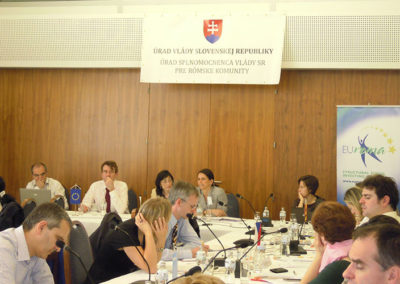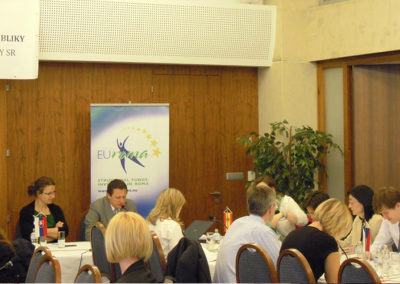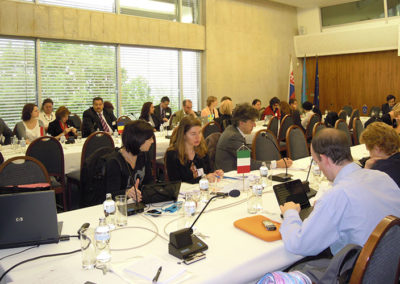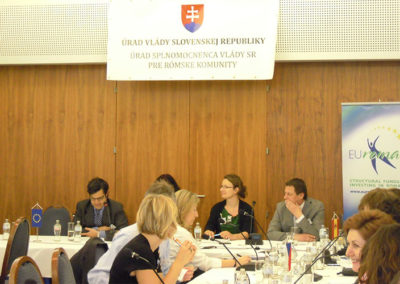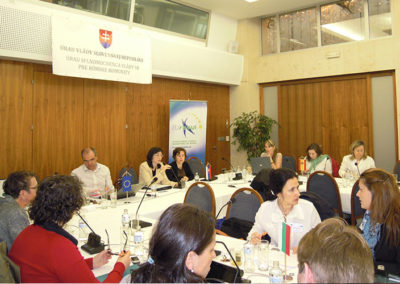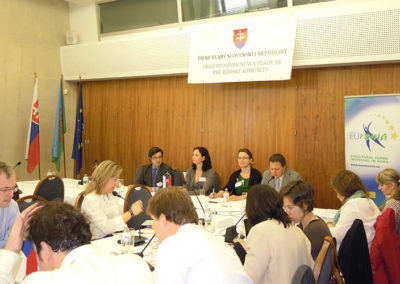The EURoma Network held its half-yearly meeting in May in Bratislava hosted by the Slovak partners. It brought together over 55 participants to discuss a wide range of topics related to Roma and Structural Funds which are currently on the European agenda.
The half-yearly meeting of the EURoma Network brought together 57 participants to discuss a wide range of topics related to Roma and Structural Funds which are currently on the European agenda. Participants included Network partners – Structural Funds Managing Authorities and the bodies in charge of Roma policies from 12 EU Member States, European Commission’s representatives (DG Justice, DG Employment and DG Regional Policy) and other relevant stakeholders as well as EURoma Technical Secretariat (Fundación Secretariado Gitano).
Officials from EU Fundamental Rights Agency (FRA), United Nations Development Programme (UNDP) and the Council of Europe (CoE), were invited to join the meeting and share their knowledge and experience regarding Roma inclusion.
The opening session was in charge of Mr Miroslav Pollák, Plenipotentiary for Roma Communities in Slovakia, Ms. Zuzana Poláčková, Director General of the ESF Division at the Slovak Ministry of Labour, Social Affairs and Family and Mr. Pedro Martos Otero from the Spanish ESF Managing Authority, leading partner of the Network.
According to the most relevant issues that are currently at the European policy agenda related to Roma inclusion (the National Roma Integration Strategies (NRIS) and the preparation of the future Regulations of the Structural Funds 2014-2020), the meeting’s agenda featured the following topics:
The contribution of Structural Funds for the implementation of the National Roma Integration Strategies (NRIS)
This session was divided into two parts. Firstly, some institutional presentations to give the context of the NRIS; secondly, a debate among participants on how the process of implementation of the NRIS is foreseen in each Member State.
All Member States have recently submitted their NRIS to the European Commission (EC) as established by the EU Framework for NRIS up to 2020. The Commission will make public its assessment of the Strategies by mid-May.
Jana Balazova, representative of the DG Justice, explained how the process of this assessment has been done in collaboration with many DGs and with inputs from social society and from the EU Platform on Roma Inclusion.
Sabine Springer, representative of the EU Fundamental Rights Agency (FRA) presented the process of the survey on the Monitoring Progress, which included, among others, information on basic socio-economic characteristics, situation in employment, education, health, housing, integration, discrimination or migration, data collected regularly across the EU.
- “…to make a tangible difference to Roma people’s lives” – Monitoring the Progress: Presentation of the Fundamental Rights Agency,Sabine Springer
Then, the Technical Secretariat presented the final version of the document “Analysis of references to Structural Funds in National Roma Integration Strategies”, which includes aspects such as the foreseen use of the Structural Funds during this programming period and the upcoming one, the mention to integrated actions and combination of EU funds, the use of the Technical Assistance and the process for the monitoring and evaluation of interventions.
These presentations were followed by a discussion among partners on the process of implementation of their National Strategies and the foreseen use of the Structural Funds supporting these strategies. One of the most relevant talking points was how to combine funds – mainly European Social Fund and European Regional Development Fund – in order to achieve more effective results on the ground.
Recent developments as regards the new Regulation of Structural Fund
The European Commission provided an overview on the Common Strategic Framework for preparation of Partnership Contracts for 2014-2020 period and on the state of the negotiations of the Regulations. Commission’s representatives emphasized the need of a better coordination of the EU funds in order to avoid overlaps and to maximize synergies.
- Dominique Be, Deputy Head of Unit, ESF Coordination, DG Employment, Social Affairs and Inclusion, European Commission
- Enrica Chiozza, DG Regional Policy, European Commission
In this line, the first draft of the EURoma Practical Guide for next Operational Programmes was presented and discussed by partners. The general aim of this guide is to support the planning process for the effective inclusion on Roma in the next Programme Period of the Structural Funds 2014-2020. This draft will be revised according to proposals and suggestions made by participants and will be concluded once the Regulations are approved.
Country Monographic
The second day of the EURoma Meeting was mainly dedicated to the host country, Slovakia. Representatives of the Plenipotentiary’s Office for Roma Issues, the Ministry of Labour, Social Affairs and Family, the Social Development Fund and also of the ad-hoc Committee of Experts on Roma Issues of the Council of Europe, provided to all participants an overview on relevant issues regarding the situation of the Roma population in the country, on the Slovak National Strategy for the Integration of Roma population, on the implementation of the local strategies of the comprehensive approach and also on the use of Structural Funds towards Roma in Slovakia. Therefore, officials from UNDP Bratislava Regional Centre presented results on surveys conducted in 2010 in cooperation with the Slovak Ministry of Labour about living conditions of Roma and the territorial distribution of Roma-relevant ESF projects.
- Strategy of the Slovak Republic for Integration of Roma up to 2020, Igor Andre, Office of the government of the Slovak Republic for Roma communities
- New approach to marginalized communities in Slovakia, Martin Vavrinčík, Department of Social Inclusion, MoLSAF SR
- The Living conditions of Roma households in Slovakia 2010, Selected results, UNDP, Daniel ¦kobla
- ESF and the Roma in Slovakia, Andrey Ivanov, UNDP BRC and Jakob Hurrle, Charles University Prague
- ESF contribution to the development of marginalized Roma communities, Marek Hojsík, Social Development Fund Slovakia
- Implementation of Local strategies of the comprehensive approach, Ms. Jana Minarovičová, Director, Dept. of Horizontal Priority MRC
- Slovak Context on Roma issue related to the Council of Europe, Ján Hero, Member of CAHROM Committee by CoE and Director of Private Secondary School of Zefyrin Jiménez Malla in Kremnica, Slovakia
The Role of International Organizations in the Social Inclusion of the Roma population
The Special Representative of the Secretary General of the CoE for Roma, Mr Jeroen Schokkenbroek, presented the role of its institution in the social inclusion of the Roma population and the types of actions developed in this line.
Closing session
The closing session, on behalf of the Technical Secretariat, made a summary of main agreements and accorded outputs and upcoming activities of EURoma. Next EURoma meeting will take place in autumn 2012 in Bulgaria and will be focused on the integrated approach for the Roma inclusion projects and the potential of the combination of EU funds.
To obtain further information on the meeting, please contact the Secretariat of the Network at info@euromanet.com.
RELATED DOCUMENTS
- Agenda
- Common Strategic Framework 2014-2020 Commission proposal, Dominique Be, European Commission, Deputy Head of Unit ESF Coordination, DG Employment, Social Affairs and Inclusion
- “…to make a tangible difference to Roma people’s lives”, Monitoring the Progress: Presentation of the Fundamental Rights Agency, Sabine Springer
- Strategy of the Slovak Republic for Integration of Roma up to 2020, Igor Andre, Office of the government of the Slovak Republic for Roma communities
- New approach to marginalized communities in Slovakia, Martin Vavrinčík, Department of Social Inclusion, MoLSAF SR
- The Living conditions of Roma households in Slovakia 2010, Selected results, UNDP, Daniel ¦kobla
- ESF and the Roma in Slovakia, Andrey Ivanov, UNDP BRC and Jakob Hurrle, Charles University Prague
- Slovak Context on Roma issue related to the Council of Europe, Ján Hero, Member of CAHROM Committee by CoE and Director of Private Secondary School of Zefyrin Jiménez Malla in Kremnica, Slovakia
- Implementation of Local strategies of the comprehensive approach, Jana Minarovičová, Dept. of Coordination of horizontal priority MRC

